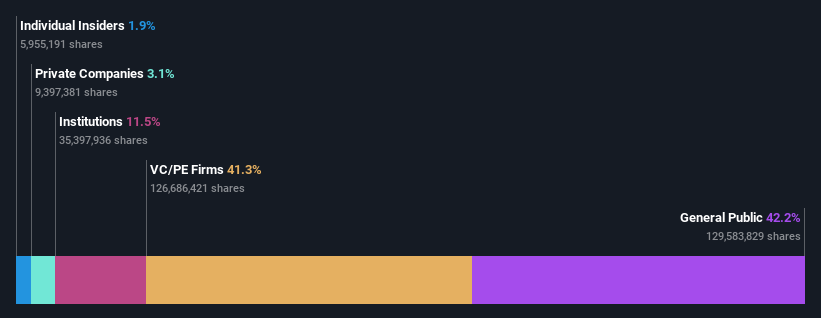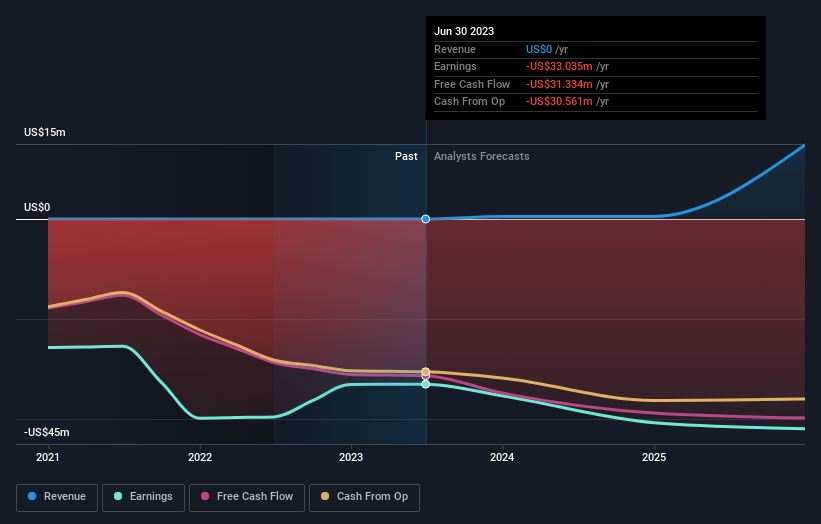Key Insights
-
EBR Systems’ significant individual investors ownership suggests that the key decisions are influenced by shareholders from the larger public
-
The top 6 shareholders own 52% of the company
To get a sense of who is truly in control of EBR Systems, Inc. (ASX:EBR), it is important to understand the ownership structure of the business. The group holding the most number of shares in the company, around 42% to be precise, is individual investors. Put another way, the group faces the maximum upside potential (or downside risk).
Private equity firms, on the other hand, account for 41% of the company’s stockholders.
Let’s delve deeper into each type of owner of EBR Systems, beginning with the chart below.
Check out our latest analysis for EBR Systems
What Does The Institutional Ownership Tell Us About EBR Systems?
Institutions typically measure themselves against a benchmark when reporting to their own investors, so they often become more enthusiastic about a stock once it’s included in a major index. We would expect most companies to have some institutions on the register, especially if they are growing.
We can see that EBR Systems does have institutional investors; and they hold a good portion of the company’s stock. This suggests some credibility amongst professional investors. But we can’t rely on that fact alone since institutions make bad investments sometimes, just like everyone does. If multiple institutions change their view on a stock at the same time, you could see the share price drop fast. It’s therefore worth looking at EBR Systems’ earnings history below. Of course, the future is what really matters.
Hedge funds don’t have many shares in EBR Systems. The company’s largest shareholder is Brandon Capital Partners, with ownership of 21%. M.H. Carnegie & Co. is the second largest shareholder owning 12% of common stock, and Split Rock Partners, LLC holds about 8.7% of the company stock.
We also observed that the top 6 shareholders account for more than half of the share register, with a few smaller shareholders to balance the interests of the larger ones to a certain extent.
Researching institutional ownership is a good way to gauge and filter a stock’s expected performance. The same can be achieved by studying analyst sentiments. While there is some analyst coverage, the company is probably not widely covered. So it could gain more attention, down the track.
Insider Ownership Of EBR Systems
The definition of company insiders can be subjective and does vary between jurisdictions. Our data reflects individual insiders, capturing board members at the very least. Company management run the business, but the CEO will answer to the board, even if he or she is a member of it.
I generally consider insider ownership to be a good thing. However, on some occasions it makes it more difficult for other shareholders to hold the board accountable for decisions.
Shareholders would probably be interested to learn that insiders own shares in EBR Systems, Inc.. As individuals, the insiders collectively own AU$4.3m worth of the AU$224m company. Some would say this shows alignment of interests between shareholders and the board, though we generally prefer to see bigger insider holdings. But it might be worth checking if those insiders have been selling.
General Public Ownership
The general public– including retail investors — own 42% stake in the company, and hence can’t easily be ignored. While this group can’t necessarily call the shots, it can certainly have a real influence on how the company is run.
Private Equity Ownership
With a stake of 41%, private equity firms could influence the EBR Systems board. Sometimes we see private equity stick around for the long term, but generally speaking they have a shorter investment horizon and — as the name suggests — don’t invest in public companies much. After some time they may look to sell and redeploy capital elsewhere.
Private Company Ownership
Our data indicates that Private Companies hold 3.1%, of the company’s shares. It might be worth looking deeper into this. If related parties, such as insiders, have an interest in one of these private companies, that should be disclosed in the annual report. Private companies may also have a strategic interest in the company.
Next Steps:
I find it very interesting to look at who exactly owns a company. But to truly gain insight, we need to consider other information, too. Be aware that EBR Systems is showing 4 warning signs in our investment analysis , and 2 of those are potentially serious…
If you would prefer discover what analysts are predicting in terms of future growth, do not miss this free report on analyst forecasts.
NB: Figures in this article are calculated using data from the last twelve months, which refer to the 12-month period ending on the last date of the month the financial statement is dated. This may not be consistent with full year annual report figures.
Have feedback on this article? Concerned about the content? Get in touch with us directly. Alternatively, email editorial-team (at) simplywallst.com.
This article by Simply Wall St is general in nature. We provide commentary based on historical data and analyst forecasts only using an unbiased methodology and our articles are not intended to be financial advice. It does not constitute a recommendation to buy or sell any stock, and does not take account of your objectives, or your financial situation. We aim to bring you long-term focused analysis driven by fundamental data. Note that our analysis may not factor in the latest price-sensitive company announcements or qualitative material. Simply Wall St has no position in any stocks mentioned.



